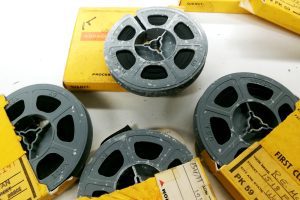 In the digital age, the allure of capturing life’s moments with a smartphone is undeniable. However, for many of us, our most cherished memories are still trapped in the analog realm – nestled away in boxes of videotapes, film reels, and outdated formats. As time marches on, these fragile media risk deterioration, making it increasingly crucial to transfer them to the digital world. By doing so, not only can you safeguard your family’s history, but you can also unlock new ways to share and enjoy these timeless moments.
In the digital age, the allure of capturing life’s moments with a smartphone is undeniable. However, for many of us, our most cherished memories are still trapped in the analog realm – nestled away in boxes of videotapes, film reels, and outdated formats. As time marches on, these fragile media risk deterioration, making it increasingly crucial to transfer them to the digital world. By doing so, not only can you safeguard your family’s history, but you can also unlock new ways to share and enjoy these timeless moments.
Understanding the Importance of Digitization
Preserving your home movies is more than just a sentimental endeavor – it’s a proactive step in safeguarding your family’s legacy. As technology advances, the formats used to record these precious memories become increasingly obsolete, making it challenging to play them back. By digitizing your old tapes and film, you can ensure that your cherished moments remain accessible for generations to come.
The Perks of Digital Preservation
-
- Longevity: Digital files are far less susceptible to degradation than their physical counterparts. With proper storage and backup, your digitized home movies can be enjoyed for decades, if not centuries, to come.
- Restoration and Enhancement: Many digital conversion services offer the ability to restore faded or damaged footage, as well as enhance the overall quality, bringing new life to your old memories.
- Accessibility and Sharing: Digitized home movies can be easily shared with family and friends, whether through online platforms, social media, or physical media like DVDs or USB drives.
- Organizational Benefits: With digital files, you can easily catalog, search, and organize your home movie collection, making it a breeze to find specific moments or events.
Understanding the Risks of Inaction
As tempting as it may be to let your old tapes and film sit in storage, the risks of inaction are significant. Over time, these analog formats can degrade, leading to lost or unplayable footage. Additionally, as technology evolves, the equipment needed to view these materials may become increasingly scarce, making it difficult to access your memories in the future.
Preparing for the Digitization Process
Before you embark on your home movie digitization journey, it’s essential to gather the necessary materials and information. This will ensure a smooth and efficient conversion process.
Assess Your Media Collection
Start by taking an inventory of your home movie collection. Identify the various formats you have, such as VHS tapes, 8mm or 16mm film, or MiniDV cassettes. This will help you determine the best approach for each type of media.
Gather the Required Equipment
Depending on the format of your home movies, you may need specific equipment to facilitate the conversion process. This can include:
-
- VCR or camcorder for VHS tapes
- Film scanner or reel-to-reel player for 8mm or 16mm film
- MiniDV player for MiniDV cassettes
- Analog-to-digital conversion devices, such as video capture cards or dongles
Consider Your Skill Level and Time Commitment
Digitizing home movies can be a time-consuming process, especially if you’re working with fragile or damaged media. Evaluate your level of technical expertise and the time you’re willing to invest in the project. If you’re not confident in your ability to handle the conversion or prefer a more hands-off approach, you may want to consider hiring a professional service.
Hiring a Professional Digitization Service
If the do-it-yourself approach doesn’t appeal to you, or you’re dealing with fragile or irreplaceable media, consider hiring a professional digitization service. These companies specialize in converting a wide range of analog formats to digital files, often with the added benefit of restoration and enhancement.
Advantages of Using a Professional Service
-
- Expertise and Equipment: Professional services have the necessary equipment, software, and expertise to handle even the most delicate media, ensuring your home movies are digitized with care.
- Restoration and Enhancement: Many services offer advanced restoration techniques, such as color correction, scratch removal, and stabilization, to breathe new life into your old footage.
- Convenience: Letting the professionals handle the digitization process frees up your time and eliminates the need to invest in specialized equipment.
- Preservation of Irreplaceable Media: If you have particularly fragile or one-of-a-kind home movies, a professional service can provide the safest and most reliable method of conversion.
Researching and Selecting a Service
When choosing a professional digitization service, consider the following factors:
-
- Reputation and Reviews: Look for companies with a proven track record and positive customer feedback.
- Services Offered: Ensure the service can handle the specific formats you need to convert.
- Turnaround Time: Inquire about the estimated time frame for completing the digitization process.
- Pricing and Payment Options: Compare quotes from multiple providers and understand any additional fees or services.
- Shipping and Handling: Confirm the company’s policies for safely shipping and returning your original media.
Storing and Organizing Your Digitized Home Movies
Once your home movies have been successfully converted to digital format, the next step is to ensure their long-term preservation and accessibility.
Backup and Storage Solutions
-
- Cloud Storage: Consider uploading your digitized home movies to a secure cloud storage platform, such as Google Drive, Dropbox, or iCloud. This provides an off-site backup and allows for easy sharing and access.
- External Hard Drives: Invest in one or more high-capacity external hard drives to store your digital files. Be sure to keep these drives in a cool, dry place and maintain regular backups.
- Optical Discs: Burn your digitized home movies to DVDs or Blu-ray discs for a more tangible storage solution. This can be particularly useful for sharing with family members.
Organizing and Cataloging Your Collection
-
- Metadata and Tagging: Use video editing software or file management tools to add metadata, such as titles, descriptions, and tags, to your digitized home movies. This will make it easier to search and locate specific footage.
- File Naming Conventions: Establish a consistent file naming system that incorporates relevant information, such as the date, event, or location, to help you keep your collection organized.
- Physical Storage: If you choose to store physical media like DVDs or external hard drives, invest in archival-quality storage solutions to protect your files from environmental factors.
Sharing and Enjoying Your Digitized Home Movies
The true value of your digitized home movies lies in the ability to share them with family and friends, as well as future generations. Explore the various ways you can breathe new life into your cherished memories.
Online Platforms and Social Media
-
- Video Sharing Sites: Upload your digitized home movies to platforms like YouTube, Vimeo, or Facebook, allowing your loved ones to view and engage with your family’s history.
- Social Media: Share short clips or highlights of your home movies on social media, sparking conversations and nostalgia among your connections.
- Virtual Gatherings: Host online viewing parties or virtual family reunions, where you can collectively enjoy your digitized home movies with loved ones near and far.
Offline Sharing and Viewing
-
- Physical Media: Create custom DVDs, Blu-ray discs, or USB drives to distribute your digitized home movies to family members, ensuring they have a tangible way to enjoy the footage.
- Projection and Screenings: Consider hosting in-person movie nights or family screenings, using a projector or large-screen TV to showcase your digitized home movies in all their glory.
- Photo Books and Albums: Combine your digitized home movies with still photographs to create comprehensive family photo books or albums, preserving your memories in a visually compelling way.
Embracing the Digital Age: Tips and Tricks
As you navigate the world of home movie digitization, keep these additional tips and tricks in mind to ensure a seamless and successful experience.
Maintaining Digital Files
-
- Regular Backups: Implement a robust backup strategy, such as the 3-2-1 rule (three copies, two local, one off-site), to safeguard your digitized home movies.
- File Format Compatibility: Consider converting your digital files to widely-supported formats, such as MP4 or AVI, to ensure long-term accessibility and playability.
- Metadata Maintenance: Regularly review and update the metadata associated with your digitized home movies to keep your collection organized and searchable.
Enhancing Your Digitized Footage
-
- Video Editing Software: Utilize user-friendly video editing tools to trim, splice, and enhance your digitized home movies, adding titles, music, or transitions to create polished, professional-looking videos.
- Color Correction and Restoration: Many video editing programs offer advanced features to correct color, reduce noise, and remove scratches or other imperfections from your digitized footage.
- Stabilization and Smooth Motion: Stabilize shaky or jittery footage and create smooth, seamless playback through the use of digital image stabilization and frame interpolation techniques.
Staying Ahead of Technological Changes
-
- Monitor Evolving Formats: As technology continues to advance, keep an eye out for new and emerging digital file formats that may become the standard for long-term preservation.
- Migrate to New Storage Media: Periodically review your storage solutions and migrate your digitized home movies to newer, more reliable media as needed to prevent data loss.
- Explore Emerging Technologies: Stay informed about innovative tools and services that can enhance the digitization process, such as AI-powered restoration or automated cataloging solutions.
Preserving your home movie collection is a labor of love, but the rewards are immeasurable. By taking the time to digitize your precious memories, you’re not only safeguarding your family’s history, but also unlocking new ways to share and enjoy these cherished moments. Whether you choose to tackle the digitization process yourself or enlist the help of professionals, the journey is well worth the effort. Embrace the digital age and let your home movies shine, inspiring joy and nostalgia for generations to come.
Contact Us (954-241-3188) To Learn More!
Tape Transfers | Audio Transfers | Film Transfers | Photo / Slide Scanning and Transfers
—
 About HB Media Solutions
About HB Media Solutions
Since 2007, we’ve been assisting South Florida families in preserving more than one million cherished memories through digitalization. We provide unbeatable value with the best pricing, top-notch video quality, and exceptional service. Our commitment to excellence includes superior quality, secure cloud storage, swift processing, convenient local dropoff, and a happiness guarantee.
 About HB Media Solutions
About HB Media Solutions



